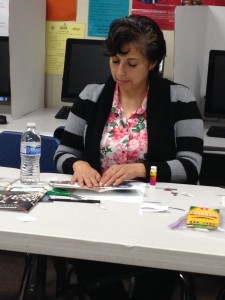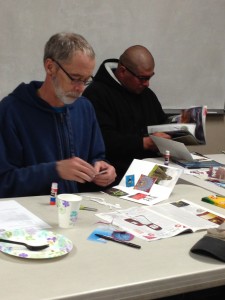Selena Bustamante and her husband Gerardo were full of anxiety when they signed up for Puente’s first-ever Project SUCCESS workshop for parents of fifth grade students who are headed into middle school next year. Their only son, Gabriel, had reached puberty earlier than the other kids in his class. The 11-year-old was misbehaving and talking back to his parents, acting sullen and distant.
They were hurt, angry and confused. “He would tell me, ‘I wish you didn’t exist,’” says Selena (whose name has been changed). They had questions for Puente’s experts, some of them slightly awkward: why was their son, who had barely worried about relations with girls, suddenly asking his parents questions about sex based on things he had heard? And how were they to answer him?
Most troublesome of all, they worried that Gabriel’s transition from elementary school to Pescadero’s middle school would expose him to drugs and alcohol – concerns that can sometimes be well founded, according to Joann Watkins, Clinical Director for Puente. “It’s an important age because they’re going into puberty, going to a different school, middle school, where there will be a lot more influence from their peers,” she says.
This year, Puente set out to address those concerns by engaging 5th grade students and parents through Project SUCCESS, an early intervention program that has been proven to be successful in the area of drug and alcohol awareness across the country. Puente wanted Pescadero and La Honda parents to learn about some of these same topics in the context of raising healthy, well-adjusted teenagers.
So Puente pioneered two successful new efforts: a brand-new 8-week workshop for every member of the outgoing 5th grade classes at La Honda and Pescadero Elementary schools. This entailed a different approach from previous years, where Watkins and her staff have focused solely on “at-risk” students – those who have already been exposed to drugs or alcohol by friends, or through a family history of substance abuse.
And for the first time, Puente held two corresponding 6-week courses – one in English and one in Spanish – for their parents, also held in La Honda and Pescadero. Puente went to great lengths to recruit busy parents, including telephone calls, flyers and sending letters home with students. Puente offered dinner, childcare and raffle prizes as additional incentives to the parents.

One of the mothers who took part in Project Success.
The Project SUCCESS curriculum is sponsored by a three-year grant from San Mateo County’s office of Behavioral Health and Recovery Services. Project SUCCESS has a long history on the South Coast, first coordinated by the La Honda-Pescadero Unified School District, and then, Puente. The grant was renewed for another three years in June.
Puente has historically used this funding for youth discussion groups and workshops on topics like drug and alcohol use, peer pressure, healthy dating, domestic violence, and the perils of rape drugs and driving under the influence. The Youth Leadership Institute, based in San Francisco, provides support for some of the programs.
The 5th grade students allowed themselves to be vulnerable and bond over the mutual trust they created in their workshops this winter, according to Celia Gagnon, a Puente Mental Health Trainee and La Honda resident who facilitated the La Honda student and parent groups. Gagnon had the students engage in art therapy by painting a mural to help pinpoint the lessons they learned during the sessions. When they were done, both student groups voted to have the murals installed inside the 5th grade classroom as a legacy for incoming students.
“It created this kind of wonderful unity and understanding. It carried into the parenting group – there was a warm feeling,” says Gagnon. In La Honda, “the parents were so pleased with it that at the end they said, how can we keep this camaraderie going?”
The parenting workshops covered the physical changes of adolescence, including changes to the limbic system, a time when moodiness and risk-taking are part of the equation; the importance of open-minded communication, in particular on the topics of drugs and alcohol; and handling children’s exposure to social media and cyberbullying, among other topics.
La Honda parent Siobhan Togliatti attended 5 out of 6 workshops offered in La Honda and says she got a lot out of them, especially in regards to her own concerns about how to stay on top of her son Guido’s computer use and preempt his exposure to inappropriate forms of media. She appreciated Puente bringing in an outside expert on the topic.
“The red flag for me is the technology stuff – the texting and video games and YouTube. As a parent, you just have to continue to read and monitor and be hard-nosed about it. You have to ask, ‘What are you watching?’” she says. “Email is next.”
Togliatti doubts her son is likely to consume drugs and alcohol, but she is aware that La Honda is not immune to those realities. “There’s a group of older kids that hangs out in town – freshman and sophomores – and I already hear stories from my son that they’re smoking pot and drinking and stuff,” she says.
Those are important concerns, and Puente has the resources to educate families and get them help if they need it. The workshops offered coping and conversation tools.

Two parents participate in Project Success.
“There were a lot of questions and fears about kids going into middle school – what about peer pressure? Bullying? It all went back to creating that connection with their kids that could help them have an open line of communication,” says Iris Fernandez, Puente’s Mental Health Intern, who facilitated the workshops in Pescadero.
Puente also brought in the principal of Pescadero Middle and High School, Pat Talbot, to tell parents what to expect at middle school and how to stay involved in their children’s education, which went a long way toward reassuring many of the parents. Talbot also discussed the safe school movement — research shows that schools with a positive and welcoming school climate increase the likelihood that students succeed academically while protecting them from engaging in high risk behaviors like substance abuse, teen pregnancy, and violence.
Selena Bustamante says having a school official talk to her group made her feel “more relaxed.” So did hearing about the science behind adolescent brain development. “My son has been going through a lot of mood changes, and I didn’t know it was normal as part of his adolescence,” she adds.
Since the workshop ended, Selena and her husband have made an effort to talk to their son in a non-judgmental way, based on the techniques they learned at Puente. Now, she says, “I have open communication with him. We talk about drugs, about alcohol and the dangers of engaging in that. One thing I learned from this class is we need to build up trust and to make an effort to answer the questions he has.”
There were other reasons Puente wanted to reach out to parents. Watkins and her staff needed a sensitive way to approach a difficult topic: alcohol and drug use within families. Teens are comfortable talking about the topic of substance abuse, but adults treat it as their “private business,” she says.
“Drugs and alcohol are a big problem in all communities, but in this community there’s such a high level of generational trauma that a number of kids are self-medicating,” Watkins explains.
“If you’re coming from a family with domestic violence, child abuse and trauma, it keeps people stuck and they pass that along to kids,” Watkins adds. “Those kids are at a much higher risk of becoming users themselves.”
Puente’s mental health program is well equipped to treat young people in need of counseling, and Puente works closely with the local school district to identify them early on. Yet that doesn’t change the fact that the kids live in an area where the acceptance level is high for kids using alcohol and drugs like marijuana. Puente would like to see that change.
It’s hard to avoid the same mistakes your parents made. But sometimes all it takes is remembering the sting of one’s own adolescence – or a deeper family pain. In their first session, each parent was asked to create his or her own collage out of magazine clippings and art supplies, depicting memories of their childhoods and the things they did. It was meant to bring parents closer to their preteens. But “it brought back a lot of memories of substance abuse in their own lives,” says Fernandez.
“One woman showed her mother praying and herself inside the car with her drunk father,” Fernandez recalls. “She talked about how she didn’t have the space to discuss these things. After being in the class, she felt she could create that safe space for her kids to do that.”




